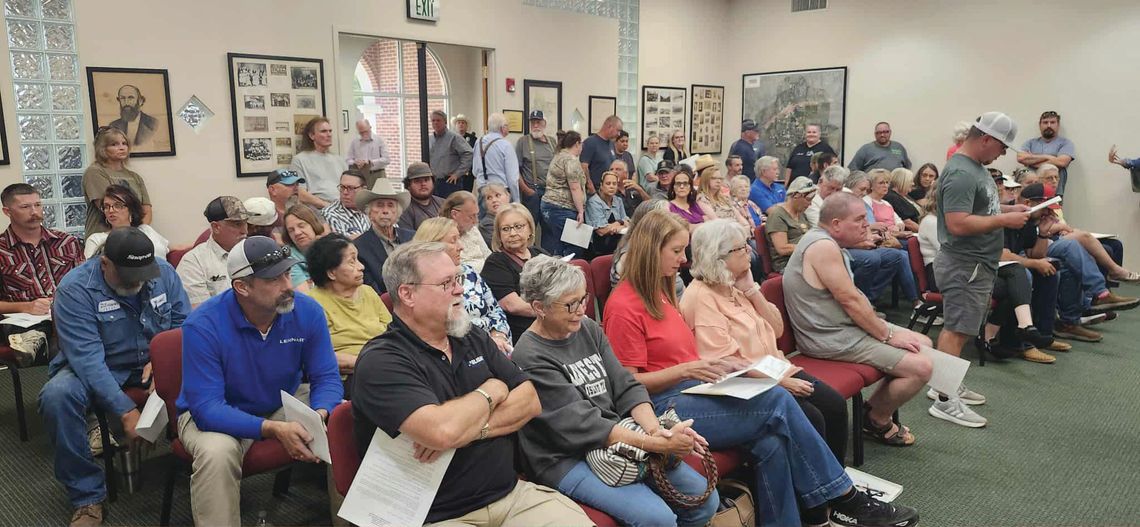*The online version of this article has been updated since press time with further clarification regarding Local Government Code Title 4 and SB1851 and also includes information about a recently-posted special called meeting.
It was standing room only at Whitesboro’s City Hall Tuesday night as citizens (and politicians, like Grayson County Commissioner Lindsay Wright and State Representative Shelley Luther) gathered for a public hearing to discuss a proposed 51% property tax increase.
The hearing opened with instructions from Mayor Jeff Butts that, while all those wishing to address the council would have three minutes to speak, the council would not respond at this point in the meeting.
Several Whitesboro residents and business owners shared their concerns about the city council’s proposed 51% property tax increase.
Some residents, like Lisa Banfield, asked the council to reconsider the budget and find ways to pare down expenses. Others voiced their concerns for neighbors and young home owners in town who are “being taxed out of their homes” as well as business owners like Danna Hensley who, under the new tax rate, would have to choose between their home and their business.
Grayson County Tax Assessor-Collector Bruce Stidham approached the podium to explain how property values are set, but before he began he asked if he could invite Rep. Luther to explain a new bill that had recently passed.
Luther then introduced Senate Bill (SB) 1851, a bill passed on Sept. 1 that requires municipalities whose audit was not completed within six months of the most recent fiscal year-end to adopt a no-new-revenue tax rate.
No-new-revenue tax rate is designed to offer a clear comparison between taxes from the previous year and the current year. It’s calculated to generate the same amount of revenue from properties that were taxed both last year and this year.
Essentially, it reflects the rate that would bring in the same amount in tax revenue as last year.
Since 1999, state law has been that “a municipality shall have its records and accounts audited annually and shall have an annual financial statement prepared based on the audit” (Local Government Code Title 4, Subtitle A, Chapter 103, Section 103.001).
Since 2007, the law has been that “the annual financial statement, including the auditor’s opinion of the statement, shall be filed in the office of the municipal secretary or clerk within 180 days after the last day of the municipality’s fiscal year” (Local Government Code Title 4, Subtitle A, Chapter 103, Section 103.003).
This means that a city's requirement to file within a six-month window is not new. The recently-passed SB1851 simply adds a penalty to the existing law. That penalty is the prohibition of cities from raising property tax rates and requiring them to adopt a no-new-revenue tax rate.
The fiscal year for the City ends the last day of September. Therefore, the audit and financial statements must be completed and/or filed by the end of March. The City of Whitesboro's most recent audit conducted for fiscal year 2023-2024 was seemingly dated June 30, 2025.
If this is the case, the City’s audit was completed and/or filed outside the six-month window required by the law. As such, the City would be in non-compliance and would therefore (according to SB1851) be unable to raise the City’s property tax rate.
“I just want you to know that I will be sending a message to the Attorney General just to make sure that everything’s right before you raise the taxes,” Luther said. “This is a brand new bill that just passed and goes into effect Sept. 1. Before you can put a tax increase into effect, you need to make sure you were audited within a certain amount of time.”
She then shared a copy of the bill with the council.
Mayor Butts closed the hearing with some final remarks.
“We’re entering into a critical period of growth in Whitesboro, and the decisions we make today will shape the town we live in tomorrow,” he said.
“Raising taxes is not easy. It’s never a popular decision. But the reality is that over the past decade, our tax rate has been stagnant. That’s not sustainable, especially with rising costs across the board for goods, services and infrastructure...No decision is made without careful consideration... Let’s move forward together with honesty, purpose and unity. Let’s make Whitesboro not just a place to live, but a town that we’re proud to call home.”
At this time, the public hearing was closed and the council moved into discussion.
However, the question of the audit’s timing caused the council to ultimately decide to table discussions and action on the tax increase, as well as the budget hearing and any action on the proposed budget for 2025-2026, to allow legal council to review the bill and its implications for the City.
No decision was made regarding the tax increase, and the council said it will re-present at a future meeting.
Per the public notice published in the Aug. 29 issue of the News-Record, the council’s proposed tax increase would bring the current property tax of $0.38 to $0.59 per $100 valuation. The no-new-revenue rate would keep taxes at $0.38.
“I really appreciate the council listening to me regarding the bill, and I think it’s admirable that they decided to table the agenda item so they could really look into this issue for their citizens,” Luther said.
On Thursday, the City posted a notice for a special called meeting set for Tuesday, Sept. 16 at 6 p.m. at City Hall. The agenda includes discussion, consideration and possible action on the proposed property tax rate for 2025; discussion, consideration and possible action on scheduling a date for a second public hearing on the proposed property tax rate for 2025 and the special called city council meeting to adopt the property tax rate for 2025.
According to the Texas Municipal League, cities have until Sept. 29 to adopt a budget and set the tax rate for the coming year.

